Arts
Folk and fusion in Galle
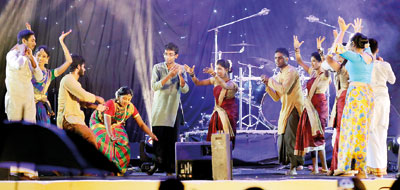 It was a mixed bag of entertainment as the Galle Music Festival, now in its seventh edition, unfolded this year on May 14 at the Galle Fort. Organized by the Sevalanka Foundation in partnership with Concerts Norway, this year’s line-up saw many traditional folk performances from all parts of the island take the stage in both morning and evening sessions.
It was a mixed bag of entertainment as the Galle Music Festival, now in its seventh edition, unfolded this year on May 14 at the Galle Fort. Organized by the Sevalanka Foundation in partnership with Concerts Norway, this year’s line-up saw many traditional folk performances from all parts of the island take the stage in both morning and evening sessions.
The morning programme was held at the Galle Good Market and the Sandasi Beat Drummers and the Islamic Social Heritage and Cultural Association gave brief performances – a preview of sorts for what was to come in the evening.
Third year students from the University of the Performing Arts, the Drummers who played traditional beats were accompanied by Gillian, one of the organizers of the Music Festival, on the flute. The Islamic Social Heritage and Cultural Association played the music of the Sufis ( devotional music inspired by the Sufi poets). Sufism is thought to be a mystical ascetic aspect of Islam, which the music of the Sufis has been derived from.
A few stalls showcased the cultural identity of the performers. The programme was aimed at giving people a chance to interact with the performers and understand their different cultures and identities. However, the over amplification of the music was a distinct put-off and the stalls and even performances were rather few and far between. The idea was great, no doubt, but the implementation needed a bit of work.
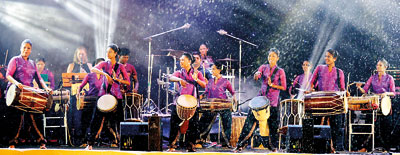
The Sandasi Beat Drummers: A lively display
The evening programme was a great improvement in terms of acoustics, as everyone was able to hear the performances clearly throughout the grounds. There was an interesting line-up, with the Indigenous Art Performing Group performing Poolikoothu, enacting a traditional hunting scene with music to accompany their performance. The act was done offstage, with four dancers dressed as a hunter and huntress and two leopards dancing amidst branches. The singing was accompanied by animal sounds, and the front row was in for a treat as the leopards even came right up to them as part of the act.
Next up were the Sandasi Beat Drummers, followed by the Thappu drummers of the Kaveri Kala Manram. This was then followed up by a collaboration of the previous two acts, and finally the two groups of drummers accompanied by leading choral group, Soul Sounds. Although all four performances were interesting in their own right, the continuation of the same groups four times in a row was a bit too much to handle, though they performed well overall. The Sufis who performed a bit later gave the audience an interesting performance which sounded quite Middle Eastern.
‘Voices’, a collaboration of the Universities of Jaffna, Peradeniya and the Eastern University had a great stage presence and really brought out their message of reconciliation. The Urban Rappers, up next had a great stage presence and soon had a good deal of the crowd up and dancing.
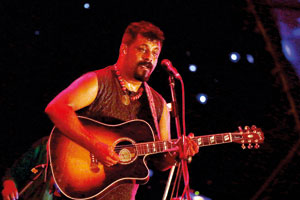
Following his dream: Raghu Dixit connects with the crowd Pix by M.A. Pushpa Kumara
Finally it was the Raghu Dixit project, an Indian folk band who played a lovely selection of folk music harmoniously blending the folk element of their music with electric sounds that gave the entire performance a contemporary feel. The project comprised of two guitarists, a violinist and a drummer. One of the guitarists was Raghu Dixit who sang a lovely mix of songs, most of which had a deep meaning which he himself explained.
He took seven years to be successful in the music industry, Dixit said, giving aspiring musicians inspiration to follow their dreams.
Interesting but rather long was the consensus among many we spoke to. However, everyone had great praise for the efforts of the organizers to unite folk performers from all over the island and were impressed with the evening overall. Juan, from Spain, felt that it was really nice to see the festival bringing people together, while Lakmal, who came from Unawatuna, felt that the performances were fantastic and commented on how much he liked the traditional groups.
One audience member who wished to be anonymous, felt that the some of the folk performances would have done better in the morning segment of the festival, where they could be shown in a more informal and community based setting – which she felt was how they were intended to be seen.
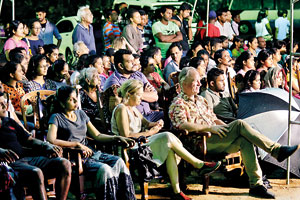
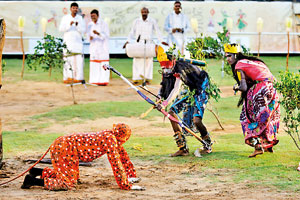
In the hunt: The Pulikoothu performers follow tradition
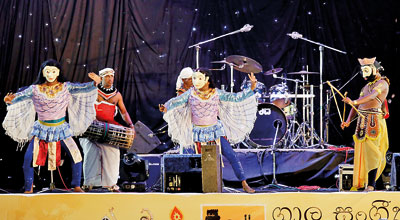
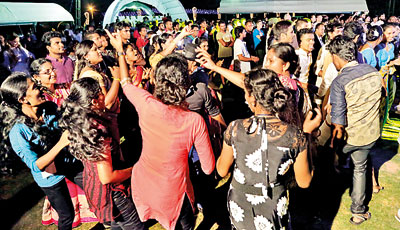
Pic by M. A. Pushpa Kumara

